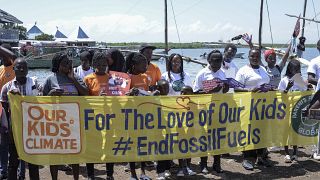Rwanda
Water ways around the world are choked with plastic pollution that often ends up in the oceans.
The UN Environmental Assembly meeting in Nairobi is discussing the problem of plastic waste.
Delegates from member countries have put forth proposals for a binding global treaty to curb plastic pollution.
Peru and Rwanda have come up with a proposal that is calling for a full spectrum approach to plastic pollution.
The proposal calls for the creation of an internationally legally binding agreement covering all stages of the plastic life cycle and by adopting a circular economy approach to plastics.
It covers plastic use and disposal, the extraction of raw materials and plastic production.
The proposal is co-sponsored by 13 countries as well as the European Union.
Environmentalist Wanjira Mathai, is the daughter of the late Kenyan Nobel Peace Prize Laureate Wangari Maathai, and vice president and regional director for Africa at the World Resources Institute.
"We must celebrate what Rwanda is trying to do because we know that on the continent Rwanda continues to lead with respect, they were the first country to ban single us plastic. Most of us followed later, keeping our environment clean. It is a country that has got credibility with respect to this agenda. I really hope they get the support that is needed. With the information we have today, with what we know today about the impacts of plastics on our oceans, on our environment we cannot be those people. We have got to find alternatives so I hope they get the support they need," says Mathai.
A recent report commissioned by the World Wide Fund for Nature (WWF) projects that plastic pollution in the world's oceans could quadruple by 2050.
The research was conducted by the Alfred Wegener Institute Helmholtz Centre for Polar and Marine Research, based in Germany.
It analysed over 2,500 studies on plastic pollution to compile all the data available on this topic and generate estimates.
The report also warns that by 2100, "marine areas more than two and a half times the size of Greenland could exceed ecologically dangerous thresholds of microplastic concentration."
It says that the amount of marine microplastic could increase by 50-fold increase by the end of the century.
And that's exactly the main problem with plastic: it disintegrates in the ocean into tiny pieces of microplastics.
In the Rwandan capital Kigali plastic waste is being recycled by a local company.
Claude Bucyensenge, a manager at the Rwanda Agroplastic factory says people also need to take responsibility for their actions and not discard litter carelessly.
" People throw plastic waste in the fields and elsewhere in nature and it causes problems. We need to change the behaviour of these people, so that they don't scatter this plastic everywhere. I think this will reduce the risk of damaging the environment and make it easier to collect them for plastic waste recycling."
He is hopeful that his country's proposal could make a positive difference if adopted by the UNEP.
" The request by Rwanda and Peru, which is in line with a full life-cycle approach to managing plastic pollution, can yield positive results. If manufacturers and retailers are held accountable for reducing and recycling plastic packaging, it will not take long to win the war on plastic waste."
The WWF report, published in early February, found that 88% of marine species studied were negatively impacted by plastic.
The researchers estimate that up to 90% of all seabirds and 52% of all sea turtles ingest plastic.












02:16
Marine plastic waste turned into school desks and chairs in Kenya
02:30
A Kenyan start-up turns plastic waste into solar-powered freezers
02:18
Lagos plastic ban divides opinion
01:14
Nigeria: Lagos state bans single-use plastics
02:23
Kenyan Artist Transforms Plastic Menace into Functional Art
02:05
Ethiopia: government promotes recycling to battle plastic pollution